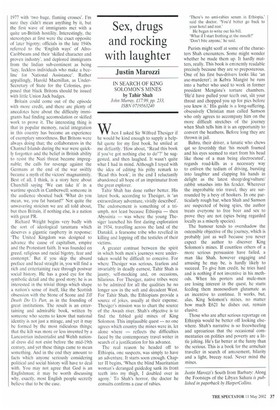Sex, drugs and rocking with laughter
Justin Marozzi
IN SEARCH OF KING SOLOMON'S MINES by Tahir Shah John Murray, £17.99, pp. 233, ISBN 0719563240 When I asked Sir Wilfred Thesiger if he would be kind enough to supply a helpful quote for my first book, he smiled at me defiantly. 'How about, "Read this book if you've got nothing else to do"?' he suggested, and then laughed. It wasn't quite what I had in mind. Although I toyed with the idea of editing his pithy remark to 'Read this book', in the end I reluctantly abandoned all hope of an imprimatur from the great explorer.
Tahir Shah has done rather better. His latest book, according to Thesiger, is 'an extraordinary adventure, vividly described'. The endorsement is something of a triumph, not least because Ethiopia — then Abyssinia — was where the young Thesiger launched his first daring exploration in 1934, travelling across the land of the Danakil, a fearsome tribe who revelled in killing and lopping off the testicles of their victims.
A greater contrast between the spirit in which both men's journeys were undertaken would be difficult to conceive. For where Thesiger was serious, fearless and invariably in deadly earnest, Tahir Shah is jaunty, self-mocking and, on occasions, hilarious. For Thesiger, native tribes were to be admired for all the qualities he no longer saw in the soft and decadent West, For Tahir Shah, the Ethiopians provide a source of jokes, usually at their expense. Thesiger's mission was to chart the source of the Awash river. Shah's objective is to find the fabled gold mines of King Solomon. This implausible quest — no one agrees which country the mines were in, let alone where — reflects the difficulties faced by the contemporary travel writer in search of a justification for his advance.
The real reason he headed off to Ethiopia, one suspects, was simply to have an adventure. It starts soon enough. Chapter II begins, 'When the blind Mauritanian woman's deranged guidedog sank its front teeth into my thigh, I doubled over in agony.' To Shah's horror, the doctor he consults confirms a case of rabies.
'There's no anti-rabies serum in Ethiopia,' said the doctor. 'You'd better go back to your hotel and rest.'
He began to write out his bill.
'What if I start frothing at the mouth?' 'Don't bite anyone,' he said.
Purists might scoff at some of the characters Shah encounters. Some might wonder whether he made them up. It hardly matters, really. This book is eminently readable precisely because they are so preposterous. One of his first bus-drivers looks like 'an axe-murderer'; in Kebra Mangist he runs into a barber who used to work in former president Mengistu's torture chambers. 'He'd have pulled your teeth out, slit your throat and chopped you up for pies before you knew it.' His guide is a long-suffering, obsessively Christian man called Samson who only agrees to accompany him on the more difficult stretches of the journey when Shah tells him it is an opportunity to convert the heathens. Before long they are thrown in jail.
Bahru, their driver, a lunatic who chews qat so feverishly that 'his mouth foamed and his eyes seemed to start from his head like those of a man being electrocuted', regards road-kills as a necessary way to enliven the tedium of driving, bursting into laughter and clapping his hands in delight as the latest sheep/dog/vulture/ rabbit smashes into his fender. Wherever the improbable trio travel, they are surrounded by a bevy of hookers. In one particularly rough bar, when Shah and Samson are suspected of being spies, the author treats everyone to free beer and sex to prove they are not (spies being regarded locally as a miserly species).
The humour tends to overshadow the ostensible objective of the journey, which is probably just as well because you never expect the author to discover King Solomon's mines. If countless others of a more serious persuasion have failed, a man like Shah, however engaging and amusing he may be, is hardly likely to succeed. To give him credit, he tries hard and is nothing if not inventive in his methods. When his porters and mule-men are losing interest in the quest, he starts feeding them monosodium glutamate as an incentive to continue. It works, but, alas, King Solomon's mines, no matter how much E621 he dishes out, remain elusive.
Those who are after serious reportage on Ethiopia would be better off looking elsewhere. Shah's narrative is so freewheeling and uproarious that the occasional commentaries on politics and poverty are a little jolting. He's far better at the funny than the serious. This is a book for the armchair traveller in search of amusement, hilarity and a light, breezy read. Never mind the mines.
Justin Marozzi's South from Barbary: Along the Footsteps of the Libyan Sahara is published in paperback by HarperCollins.






































































 Previous page
Previous page